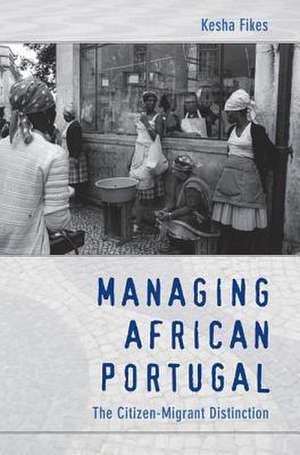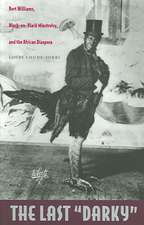Managing African Portugal – The Citizen–Migrant Distinction
Autor Kesha Fikesen Limba Engleză Paperback – 16 noi 2009
Preț: 236.48 lei
Nou
Puncte Express: 355
Preț estimativ în valută:
45.25€ • 47.24$ • 37.45£
45.25€ • 47.24$ • 37.45£
Carte tipărită la comandă
Livrare economică 04-18 aprilie
Preluare comenzi: 021 569.72.76
Specificații
ISBN-13: 9780822345121
ISBN-10: 0822345129
Pagini: 224
Ilustrații: 10 illustrations
Dimensiuni: 179 x 235 x 14 mm
Greutate: 0.3 kg
Editura: MD – Duke University Press
Locul publicării:United States
ISBN-10: 0822345129
Pagini: 224
Ilustrații: 10 illustrations
Dimensiuni: 179 x 235 x 14 mm
Greutate: 0.3 kg
Editura: MD – Duke University Press
Locul publicării:United States
Cuprins
Contents; Preface; AcknowledgmentsIntroduction; 1. Miscegenation Interrupted; 2. Ri(gh)tes of Intimacy at Docapesca; 3. Black Magik Women: Policing Appearances; 4. Being in Place: Domesticating the Citizen-Migrant Distinction; 5. Regulating the Citizen, Disciplining the Migrant; Afterword: After IntegrationNotes; References; Index
Recenzii
Managing African Portugal is a timely, invaluable contribution to the study of African migrants in Europe. Kesha D. Fikes offers a thoughtful examination of how colonialisms legacies inform the social politics of a European nation-state now significantly embedded within the contours of the European Union. In so doing, she illuminates interpretations of race as historically constituted effects of different political regimes and policies. Paulla A. Ebron, author of Performing AfricaManaging African Portugal is a moving ethnography of the fraught but persistent lives of Cape Verdean peixeiras (fishmongers) caught between the cultural logics of citizenship, remittances, and migrant labor. But it is also a searing account of how state organized antiracist campaigns, meant to free citizens like the peixeiras from racial violence, can be one of the means of locking them into new forms of class violence.Elizabeth A. Povinelli, author of The Empire of Love: Toward a Theory of Intimacy, Genealogy, and Carnality
Notă biografică
Textul de pe ultima copertă
""Managing African Portugal" is a moving ethnography of the fraught but persistent lives of Cape Verdean peixeiras (fishmongers) caught between the cultural logics of citizenship, remittances, and migrant labor. But it is also a searing account of how state-organized anti-racist campaigns, meant to free citizens like the peixeiras from racial violence, can be one of the means of locking them into new forms of class violence."--Elizabeth A. Povinelli, author of "The Empire of Love: Toward a Theory of Intimacy, Genealogy, and Carnality"
Descriere
An ethnography of Cape Verdean immigrant women in Portugal









